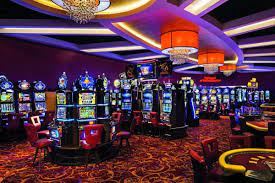Casinos have long been synonymous with glamour, excitement, and the promise of wealth. From the dazzling lights of Las Vegas to the opulent establishments of Monte Carlo, these gambling empires draw millions of visitors each year, seeking their fortune amidst the spinning roulette wheels and clinking slot machines. Yet, behind the via4d façade lies a world of controversy and debate, where questions about morality, addiction, and economic impact persist.
At its core, a casino is a facility that houses various forms of gambling activities. From classic table games like blackjack, poker, and roulette to modern electronic gaming machines, casinos offer a wide array of options for patrons to try their luck. The allure of these games lies in the adrenaline rush of risk-taking and the possibility of winning big.
One of the most famous gambling destinations in the world is undoubtedly Las Vegas, often referred to as the “Entertainment Capital of the World.” The Las Vegas Strip, lined with colossal casino resorts, epitomizes the extravagance and excessiveness associated with the industry. Visitors are greeted with towering skyscrapers adorned with neon lights, extravagant stage shows, and an endless array of dining and entertainment options. The atmosphere is electric, drawing in people from all walks of life, from casual tourists to high-rolling gamblers.
Beyond the glitz and glamour, however, lies a darker side to the casino industry. Critics argue that casinos exploit human vulnerabilities, particularly those struggling with gambling addiction. The accessibility and availability of gambling opportunities within casinos can exacerbate addictive behaviors, leading to financial ruin and personal hardship for individuals and their families. Studies have shown that problem gambling is a serious issue, with consequences ranging from debt and bankruptcy to depression and suicide.
Moreover, the economic impact of casinos is a subject of ongoing debate. While proponents argue that casinos stimulate local economies by creating jobs, attracting tourists, and generating tax revenue, opponents contend that the benefits are often overstated and outweighed by the social costs associated with gambling addiction and crime. The presence of casinos can also lead to the displacement of other businesses and industries, as well as exacerbate economic inequality within communities.
Despite these controversies, the casino industry continues to thrive, fueled by a combination of technological innovation, aggressive marketing tactics, and a growing global demand for entertainment and leisure activities. The rise of online casinos has further expanded the reach of gambling, allowing individuals to access virtual gaming platforms from the comfort of their own homes.
Regulation and oversight play a crucial role in mitigating the potential harms associated with casinos. Governments implement strict licensing requirements, age restrictions, and responsible gambling measures to ensure that operators comply with legal and ethical standards. Efforts to promote responsible gambling include education and awareness campaigns, self-exclusion programs, and support services for those affected by gambling addiction.
In conclusion, casinos represent a complex and multifaceted industry, embodying both the allure of excitement and the controversy of ethical concerns. While they offer entertainment and opportunity for some, they also pose risks and challenges that cannot be ignored. As the debate surrounding casinos continues, it is essential to strike a balance between promoting economic growth and safeguarding public health and well-being. Only through responsible regulation and vigilant oversight can we ensure that the benefits of casinos are maximized while minimizing their potential harms.



